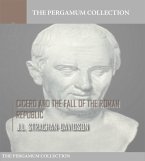Sallust's 'Conspiracy of Catiline and the Jugurthine War' is a classic work of Roman historical literature that provides a detailed account of two significant events in ancient Roman history. Written in a concise and vivid style, Sallust's narrative captures the political turmoil and corruption that plagued the Roman Republic during the time of Catiline's conspiracy and the Jugurthine War. The book offers valuable insights into the characters and motivations of the key players involved in these tumultuous events, shedding light on the challenges faced by Rome in maintaining its power and integrity. Sallust, a Roman historian and politician, was known for his critical view of the Roman elite and his condemnation of their moral decay. His firsthand experience in Roman politics and his desire for moral reform are evident in his writings, including 'Conspiracy of Catiline and the Jugurthine War'. Sallust's work reflects his belief in the importance of virtue and integrity in governance, making his accounts of historical events both informative and morally instructive. I highly recommend 'Conspiracy of Catiline and the Jugurthine War' to readers interested in Roman history, politics, and moral philosophy. Sallust's meticulous research and keen insights offer a compelling analysis of the challenges faced by the Roman Republic and the timeless lessons that can be drawn from its past struggles.
Dieser Download kann aus rechtlichen Gründen nur mit Rechnungsadresse in A, B, BG, CY, CZ, D, DK, EW, E, FIN, F, GR, H, IRL, I, LT, L, LR, M, NL, PL, P, R, S, SLO, SK ausgeliefert werden.









